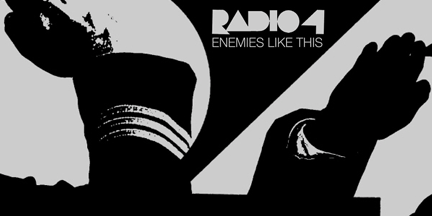
“Enemies Like This”
from the album Enemies Like This
2006
iTunes
Music and politics have often mixed to piss poor results. Already given a massive and rapt audience, artists that release ‘political’ albums assume that the same audience is simply politically benighted. So they try and break it down for us common folk with sundry platitudes: war is bad, capitalism kills, and politicians don’t have your back. They want us to get mad, shake our fists, and even “mosh.” But the real travesty is the music itself, which is tempered and tethered to make sure every word of those platitudes comes through clearly. The message is deemed so important that the music is often neglected.
All this isn’t to deny the veracity of their political claims, but merely to show that whether or not your message is right is least relevant; what matters is whether or not you make us believe it’s right. MC5, Bob Dylan, and Fela Kuti made us believe because they were good musicians first. No one would ever kick out the jams over some AOR fodder or yell ‘Shakara’ over generic funk; the music always had to get right with the message or both would die. Even though it took them four albums to do the same, Radio 4 have finally captured that precise balance on Enemies Like This. Using disarming, straightforward rock with some unique touches, the New York four-piece crafts an impressive political statement while abstaining from didactic prose.
So how does it work? How does a band create a scintillating political pronouncement in an album without explicit reference to politics? Admittedly, some of it is found in the lyrics like “in the kingdom, opinions get lost/ Cause they’re not sure what the servants can cause” from “Packing Things up on the Scene” and from their catalogue (especially 2004’s disappointing Stealing of a Nation), but most of it is buried in the sound itself. Marrying post-punk aesthetics with an appreciation for simple, danceable grooves, Radio 4 don’t want to be political by dint of the message, but because of the spirit of the messages themselves. Songs here are marked by a renewed vigor and a redoubled dedication to the sonic structures that groups like Gang of Four and Mission of Burma perfected.
Ironically enough, the band employed Jagz Kooner for production, and anyone familiar with the small fracas made over Kasabian’s pseudo-political chic-rock debut may be hesitant to try Radio 4’s latest. But Radio 4 provide more energy and exigency to their effort as well as a grit to their sound. If anything, they’re Kasabian with teeth and chutzpah. The opening drums on the title track are accompanied by untreated guitars and a popping bass line, all combining for the verses. For the chorus the bass gains speed and weight, as do the guitars, cymbals come crashing into the space, and a piano melody rounds out the song. Their groove-centered approach is apparent here, but far more puissant with other tracks.
“Too Much to Ask For” and “This Is Not a Test” are crowd rompers of the highest type, the former guided strongly by the bass and flurried drumming while the latter, again using the bass and drums as foundation, also propels itself with sundry instrumental flourishes like maracas, bells, and guitar distortion. Elsewhere the band shows the source of their groove with the reggae-influenced “Ascension Street” and “Everything’s in Question” as well as “As Far as the Eye Can See,” which takes a cue from modern Dance and uses synth and handclaps. “All in Control” uses light electronic noodling, but only as an introductory guide to the song’s rhythm. Again, the band itself takes center stage, leading the piece to its full and exciting conclusion.
Whittled down to ten tracks from 16, the group sought to create a terse but by no means truncated statement. Sharp, intelligent, and (most importantly) highly enjoyable, Enemies Like This is probably the height of the group’s creative abilities.


